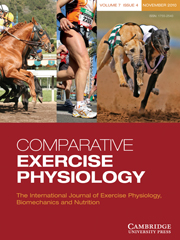Article contents
The effect of training and cessation of training on plasma total carbon dioxide in Standardbred horses
Published online by Cambridge University Press: 14 June 2010
Abstract
Twenty-seven mature Standardbred mares (9–27 years, ~522 kg) were used to test the hypothesis that training and short-term cessation of training would alter total plasma total carbon dioxide (tCO2) concentrations. Plasma tCO2 concentrations were measured in blood samples (20 ml) collected at rest from the same ten unfit mares that were used in two separate studies that were conducted 1 month apart. Comparisons between the samples obtained from the two trials were made to demonstrate the consistency of plasma tCO2 concentrations in the untrained population. Another set of resting blood samples was collected from an additional 17 mares that were being utilized in a training study that was under way during the same period. All the mares were housed in groups on dry lots, and were fed approximately 12 kg of mixed alfalfa-grass hay divided into two feedings per 24 h period. During the ‘detraining’ period, the 17 horses were housed in 5 × 5 m stalls, and were fed the same hay ration. Water and trace-mineral blocks were available ad libitum. Blood samples were collected from the mares prior to the last session of their 12 weeks of training at 60% HRmax (maximum heart rate), as well as on the third day following 2 days of detraining (simulated quarantine). Plasma tCO2 concentrations were measured in duplicate using a Beckman EL-ISE analyser. For data analysis, t-tests with the a priori level of statistical significance set at P < 0.05 were used. Resting plasma tCO2 concentrations were lower (P < 0.05) in the trained horses (31.4 ± 1.9 mMol l− 1) than in the untrained horses (34.4 ± 0.9 mMol l− 1). There were no effects (P>0.05) due to cessation of training. It was concluded that training causes a decrease in plasma tCO2 concentrations that is not reversed by limited cessation of training.
Information
- Type
- Short Communication
- Information
- Copyright
- Copyright © Cambridge University Press 2010
References
- 3
- Cited by

